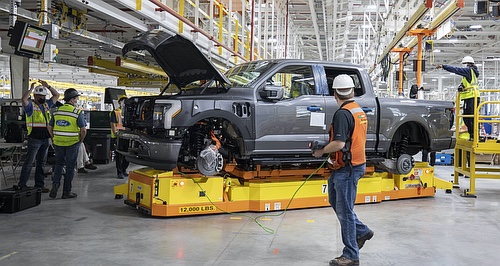Make / Model Search
News - FordFord goes down range extender roadLacklustre BEV sales and mounting losses prompt Ford to accelerate EREV development10 Feb 2025 FORD Motor Company CEO Jim Farley has announced fixes for the Blue Oval’s massively unprofitable global battery electric vehicle (BEV) sales, which racked up losses of more than $US5 billion ($A8 billion) last year with a similar loss the year before and even more red ink from BEVs predicted this year.
Dearborn has spooled up development of extended range electric vehicle (EREV) technology for introduction across its range of SUVs, crossovers and pick-ups – the most profitable vehicles in its line-up that have a strong market presence in the North America.
This was confirmed recently by Mr Farley, who announced a "skunkworks” to expedite EREV development and production saying Ford was developing SUV and pick-up platforms for petrol-electric EREVs as part of a new electrified vehicle strategy.
EREVs under development have a series hybrid powertrain in which the wheels are exclusively driven by electric motors and a petrol engine exists purely to generate electricity, much like Nissan’s E-Power system available in X-Trail and Qashqai but with a larger battery enabling longer distances for engine-off driving.
Ford’s change of tack comes after the car-maker announced it would delay a new Ranger-size battery electric pick-up truck to 2027 and drop planned production of three-row battery electric SUVs in August (already previously delayed) at a loss of nearly $A3.0 billion alone.
Late last year, Mr Farley said the “slow uptake of EVs” forced Ford to idle the F-150 Lightning plant from November until year’s end, followed weeks later at a fourth quarter earnings call in which he said that “for larger retail electric utilities, the economics are unresolvable (for private buyers)”.
“These customers have very demanding use cases for an electric vehicle. They tow, they go off road, they take long road trips.
“These vehicles have worse aerodynamics and they’re very heavy, which means very large and expensive batteries.
“Retail customers have shown that they will not pay any premium for these large EVs (including SUVs), making them a really tough business case given the expense in the batteries,” he said at the time.
Mr Farley added that fleet buyers are OK with large electric vehicles but the same is not the case with vehicles aimed at private buyers – at least in the US.
This is compounded by the presence of Tesla’s Cybertruck and others, the F-150 Lightning’s high purchase price related to its size, weight and large battery, inadequate recharging facilities in the US and the Lightning’s real-world battery range, which has been heavily criticised by owners and put many off purchasing another BEV in future.
After suffering a drop in global BEV sales in 2024, Ford’s new electrified vehicles, yet to have a launch date, will be “more affordable to grab a larger share of electrified car sales”.
Car industry commentators in the US say the BEV market has turned as mainstream car buyers balk at high prices and spotty charging infrastructure.
Fortune reported that “while the global slowdown hit every automaker, it’s left Ford Motor Co especially vulnerable because the company has no new EV models coming for more than two years”.
“The manufacturer ‘abandoned’ plans to build two million electric vehicles by 2026, along with any near-term hope of earning a return on the tens of billions of dollars it’s poured into developing battery-powered models.” the publication stated.
“Rivals have begun rolling out their own electric models – including innovative, lower-cost options – and it will take years to execute on a strategy that could make Ford more competitive.
Then there is the elephant in the room surrounding the possibility of President Donald Trump making Ford’s (and other auto-makers) task more difficult as he may yet impose a 25 per cent tariff on goods from Mexico where Ford builds its Mustang Mach-E.
President Trump may also cut a $US7500 consumer tax credit that helps dealers sell battery-powered cars.  Read more23rd of January 2025  Ford returns Ranger Wildtrak XLimited numbers of well-kitted Ford Ranger Wildtrak X available from $77,640 +ORC22nd of January 2025  Ford Everest Wildtrak returns to showroomsJust 950 examples of the Ford Everest Wildtrak are now available from $76,950 +ORC5th of December 2024  Ford Puma Gen-E out, Transit PHEV inFord scraps Puma Gen-E, instead bringing Transit Custom PHEV to Oz |
Click to shareFord articlesResearch Ford Motor industry news |











Facebook Twitter Instagram